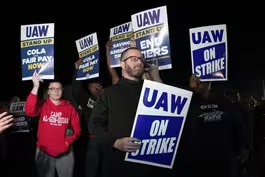
Brooks and Capehart on Biden's impeachment inquiry
Clip: 9/15/2023 | 11m 29sVideo has Closed Captions
Brooks and Capehart on Biden's impeachment inquiry and tensions among House Republicans
New York Times columnist David Brooks and Washington Post associate editor Jonathan Capehart join Geoff Bennett to discuss the week in politics, including rising tensions in the House as lawmakers launch an impeachment inquiry into President Biden.
Problems playing video? | Closed Captioning Feedback
Problems playing video? | Closed Captioning Feedback
Major corporate funding for the PBS News Hour is provided by BDO, BNSF, Consumer Cellular, American Cruise Lines, and Raymond James. Funding for the PBS NewsHour Weekend is provided by...

Brooks and Capehart on Biden's impeachment inquiry
Clip: 9/15/2023 | 11m 29sVideo has Closed Captions
New York Times columnist David Brooks and Washington Post associate editor Jonathan Capehart join Geoff Bennett to discuss the week in politics, including rising tensions in the House as lawmakers launch an impeachment inquiry into President Biden.
Problems playing video? | Closed Captioning Feedback
How to Watch PBS News Hour
PBS News Hour is available to stream on pbs.org and the free PBS App, available on iPhone, Apple TV, Android TV, Android smartphones, Amazon Fire TV, Amazon Fire Tablet, Roku, Samsung Smart TV, and Vizio.
Providing Support for PBS.org
Learn Moreabout PBS online sponsorshipGEOFF BENNETT: This week, President Biden faced the opening of an impeachment inquiry in the House of Representatives, and his son faced an indictment on federal gun charges.
We turn now to the analysis of Brooks and Capehart.
That's New York Times columnist David Brooks, and Jonathan Capehart, associate editor for The Washington Post.
Good to see you both, as always.
JONATHAN CAPEHART: Geoff, good to be with you.
GEOFF BENNETT: So there are more indicators that the 2024 presidential race could play out in congressional committee rooms and courthouses, more so than in the early voting states.
Jonathan, the fact that Hunter Biden has now been indicted by federal prosecutors on this gun charge after his plea deal fell apart, how will that impact the Biden campaign?
JONATHAN CAPEHART: Well, it'll impact the Biden campaign only in as much as it is the president's son who is facing accountability, unlike the person he's probably going -- the president's probably going to run against, who will actually be the person in the courtroom, in several courtrooms in four jurisdictions around the country, while he's also running for president.
Look, the president loves his son.
I'm sure this is a painful time for him personally.
But as the campaign goes on and, assuming this does go to trial -- you listen to a lot of legal analysts, they say this is not -- this probably won't go to trial.
But if it does, the longer this goes on and the president is asked questions about it, he will have to answer.
But I think it's incumbent upon us in the press to, like, keep some perspective here.
The charges he's -- that this president's son's facing is nowhere near the charges that the former president of the United States is facing.
GEOFF BENNETT: Well, that's right.
Hunter Biden's alleged misdeeds do not compare at all, in terms of the scale and the quantity of Donald Trump's alleged crimes.
Still, though, it's an interesting strategy among Republicans to try to exploit this perceived vulnerability and distract from Donald Trump's legal troubles.
You think it's an effective one?
DAVID BROOKS: No, Donald Trump's legal troubles are not something we're going to ignore.
I -- the gun thing to me, it's a distraction, to me.
I'm not going to waste three neurons on that one.
But the influence peddling should be investigated.
I don't think there should be an impeachment inquiry about it.
But Hunter Biden was in the business of peddling influence.
And it's not clear he actually peddled any influence.
It's not clear his dad did anything.
But it should be looked into.
His dad was somewhat involved in some of the conversations, maybe only in small talk.
But he was somewhat involved.
And so we should know whether Hunter Biden's business was a sham, pretending to peddle influence that he didn't actually have, or whether there was some substance to it.
So that, to me, merits an inquiry.
It does not merit an impeachment.
An impeachment should be, holy cow.
We should have, like, some evidence of something truly shocking before we take the extraordinary step of beginning an impeachment inquiry, or else we just risk cheapening the whole impeachment process.
GEOFF BENNETT: And Republicans, Jonathan, have failed to produce any evidence of wrongdoing.
Pennsylvania Senator John Fetterman was asked about this inquiry in the halls of the U.S. Senate, and this was his response.
SEN. JOHN FETTERMAN (D-PA): Oh, my God, really?
Oh, my gosh.
Oh, it's devastating.
(LAUGHTER) SEN. JOHN FETTERMAN: Ooh, don't do it.
Please, don't do it.
GEOFF BENNETT: So, setting aside the senator's sartorial choices, I mean, the fact that he made fun of it, he's dismissing it in a cartoonish way, is that a mistake?
Should Democrats take this seriously?
JONATHAN CAPEHART: Yes, Democrats absolutely should take this seriously.
And I get where the senator is coming from.
To David's point, there's no evidence here yet.
And if the Republicans were serious, the Oversight Committee under Chairman Comer would be doing a more -- a serious investigation, instead of a fishing expedition that they're on so far, finding nothing.
And so that's why the senator is like, ooh, ooh, this is so scary.
But, on the other hand impeachment is a big deal and the American people, whether they know there's evidence or not, are going to say, wait, what?
He's being impeached.
Oh, this is terrible.
This is what happens to terrible people who do terrible things.
And we don't have any evidence of that at all.
But the key thing here is, the senator is reacting that way.
The White House is not.
The White House is absolutely taking this seriously.
And that's exactly what they should be doing.
GEOFF BENNETT: For Kevin McCarthy to green-light this inquiry, does he now have to follow this to its natural end?
I mean, does he have any off-ramp here?
DAVID BROOKS: Oh, yes, he does.
First, I want to support any senatorial use of sarcasm.
We don't have enough of that.
(LAUGHTER) GEOFF BENNETT: Noted.
DAVID BROOKS: Yes, because his caucus is not -- is not all the way there.
There are a lot of people who are Republicans who are saying, well, impeachment backfired on Republicans when they did it to Clinton.
It sort of backfired on the Democrats when they did it to Trump.
This is stupid.
And they can be pretty hard right.
They could be not hard right.
But they just look at the history of impeachment and realize that people don't like this stuff.
So we should not do this.
And so he has a lot of people in his caucus who would be very happy to let this go.
GEOFF BENNETT: What about that?
It also raises the question of how the House speaker is handling the pressure from the far right wing of his party, not just on impeachment, but on funding the government and the infighting.
I mean, there's some extraordinary reporting from inside a House caucus meeting, Republican Caucus meeting this week.
JONATHAN CAPEHART: Yes, some F-bombs were dropped in this Republican Caucus meeting.
But, yes, the pressure is getting to the speaker, which is why he is dropping F-bombs.
And there might not be enough votes in the caucus to actually approve impeachment, but there aren't enough votes in the caucus to pass a budget.
And that's why we are hurtling to a government shutdown.
The speaker, I thought, from the reporting, he thought that, oh, I will just say that I'm authorizing an impeachment inquiry, and that will be enough to satisfy Matt Gaetz and Marjorie Taylor Greene, and we can get on with the business of a C.R.
and then get to the point of passing a budget.
That is off the table now, and so we're less than, what, 10 working days before Congress runs out of runway to come up with a budget by October 1.
The government's going to shut down because of this insanity.
GEOFF BENNETT: What do you make of the situation in which the House speaker finds himself?
DAVID BROOKS: Yes, it's like -- being House speaker is like having a really bad old boat.
(LAUGHTER) DAVID BROOKS: Like, it's one of those things where your only -- your happy day is the first day you get it, the day you get rid of it, so I think that's the experience of being speaker.
And it does -- this Congress came in, and especially the Republicans, with two words on their mouth, regular order.
We're going to do Congress the way it's supposed to be done.
We will have this -- set the targets, committees will do their work, it'll look the way it's supposed to.
Well, that's gone.
It's completely shambolic.
And so I still think, as they always do, they will -- and as happened a couple months ago, that they will come up with some sort of rough deal to prevent a government shutdown, because people know how terrible that would be politically for them.
But it certainly doesn't look like regular order to me.
GEOFF BENNETT: At the risk of sounding naive, I mean, what does it mean that this Congress can't pass bills through the regular order, which is to take bill by bill, as opposed to doing it, what they call the omnibus method, which is to just throw it all together?
Because that really is, to your point, the only way they can get things done these days.
DAVID BROOKS: Yes, well, this is the history of my life.
(LAUGHTER) DAVID BROOKS: Like, since I have been covering this, they do these big omnibus things.
And so I'm going to bring in -- Mitt Romney, we had the story.
Maybe we will talk about it later.
He -- when the impeachment process came to him, he sat there and he studied the evidence, he prayed about it, he consulted experts.
He did things like a member of Congress would do.
And that norm -- like, he was probably the only one who did that.
And that norm, especially on the budget side, really has -- the norms of how we do budgets has completely broken down.
And so we have been at this for decades now.
GEOFF BENNETT: Well, David raised it, Mitt Romney's decision not to run for reelection.
How does it affect the Senate to lose another moderate Republican voice?
JONATHAN CAPEHART: Well, not just a moderate Republican voice, a statesperson, a person of conscience, a person who took his job seriously, took the job of senator seriously, took the -- and what it means to be one of 100 and what it means for the functioning of American government.
It was surprising, but not surprising, I mean, surprising because we need voices like that.
I don't agree with Senator Romney on just about everything, but I do -- I respect him and I respect the fact that he truly has service in his heart.
But it's surprising because we -- like, the nation needs him.
But I understand why he wants to leave, because why do you want to be in an institution where regular order is gone, there are no -- there aren't -- there are very few other serious people around you?
GEOFF BENNETT: What was it that -- it was, what, George Washington who told Thomas Jefferson that the Senate was supposed to be the saucer to cool the business of the House, in much the way that a saucer cools a cup of tea.
And as the Senate in some ways becomes more like the House, I mean, what's the net effect of that?
DAVID BROOKS: That's another lifetime story for me.
The Senate used to be very different from the House, and -- but -- and they all had this collegial -- you go to the Senate Dining Room and they were always like buddy-buddy.
There's a little room off the Senate floor where they -- there was bourbon and they could have a drink together.
And, now, these days, I would go in that room and the bourbon levels in the bottle didn't go down.
Like, no one was having a drink together.
There was no collegiality.
There's none of the flattering they used to do to each other.
And so the Senate has become a place to go to get on TV, just like the House, only a little more successful.
And Mitt Romney, he came to Congress, a very earnest guy, came to the Senate, had a list of things he wanted to pass.
And his staff was like, what?
What are you doing?
That's not what we do here.
And so I lament a -- just think of the kind of Republicans that used to be common, George H.W.
Bush, George Romney.
That's all gone.
And so that's one thing.
And then the other thing, we have learned -- Romney gave interviews to "The Atlantic" published this week.
And we learned, A, how often -- there have been times when Trump has gone in to talk to the Republican Caucus.
He's left the room and they all laugh contemptuously at him.
And so that level of bad faith is pretty high.
We have also learned, the final thing, is that there are members who were going to vote to convict on impeachment, but were afraid that they or their families might get assassinated, and they knew their vote wouldn't make a difference.
Like, we are way beyond the bounds of normal democratic governance, when that's even on the minds of members of Congress.
GEOFF BENNETT: And Senator Romney's saying he pays something like $5,000 a day in personal security because of threats that he and his family face.
As we pine for the days of yesteryear, in the, what, 10 seconds we have left, is there a way back?
(LAUGHTER) JONATHAN CAPEHART: Yes, there is a way back, and it's called leadership, leadership, particularly among Republicans.
GEOFF BENNETT: All right, Jonathan Capehart, David Brooks, great to see you all, as always.
DAVID BROOKS: Good to see you.
JONATHAN CAPEHART: Thanks, Geoff.
Devastation grips Libya after catastrophic flooding
Video has Closed Captions
Clip: 9/15/2023 | 3m 16s | Devastation grips Libya after catastrophic flooding (3m 16s)
Iran tightens security before anniversary of woman's death
Video has Closed Captions
Clip: 9/15/2023 | 7m 23s | Iran tightens security before anniversary of Mahsa Amini's death (7m 23s)
New Wrap: New England braces for impact of Hurricane Lee
Video has Closed Captions
Clip: 9/15/2023 | 4m 52s | New Wrap: New England braces for impact of Hurricane Lee (4m 52s)
Ohio town looks for answers months after train derailment
Video has Closed Captions
Clip: 9/15/2023 | 7m 38s | Ohio town searches for answers months after toxic train derailment (7m 38s)
Reports shows staggering spike in Louisiana prison deaths
Video has Closed Captions
Clip: 9/15/2023 | 5m 5s | Reports shows staggering spike in Louisiana prison deaths (5m 5s)
Sister searches for Princeton student missing in Iraq
Video has Closed Captions
Clip: 9/15/2023 | 5m 44s | Princeton student’s sister urges action months after suspected abduction by Iraqi militia (5m 44s)
UAW strikes after deadline with automakers expires
Video has Closed Captions
Clip: 9/15/2023 | 5m 27s | United Auto Workers strike after deadline expires between the union and automakers (5m 27s)
Providing Support for PBS.org
Learn Moreabout PBS online sponsorshipSupport for PBS provided by:
Major corporate funding for the PBS News Hour is provided by BDO, BNSF, Consumer Cellular, American Cruise Lines, and Raymond James. Funding for the PBS NewsHour Weekend is provided by...


















